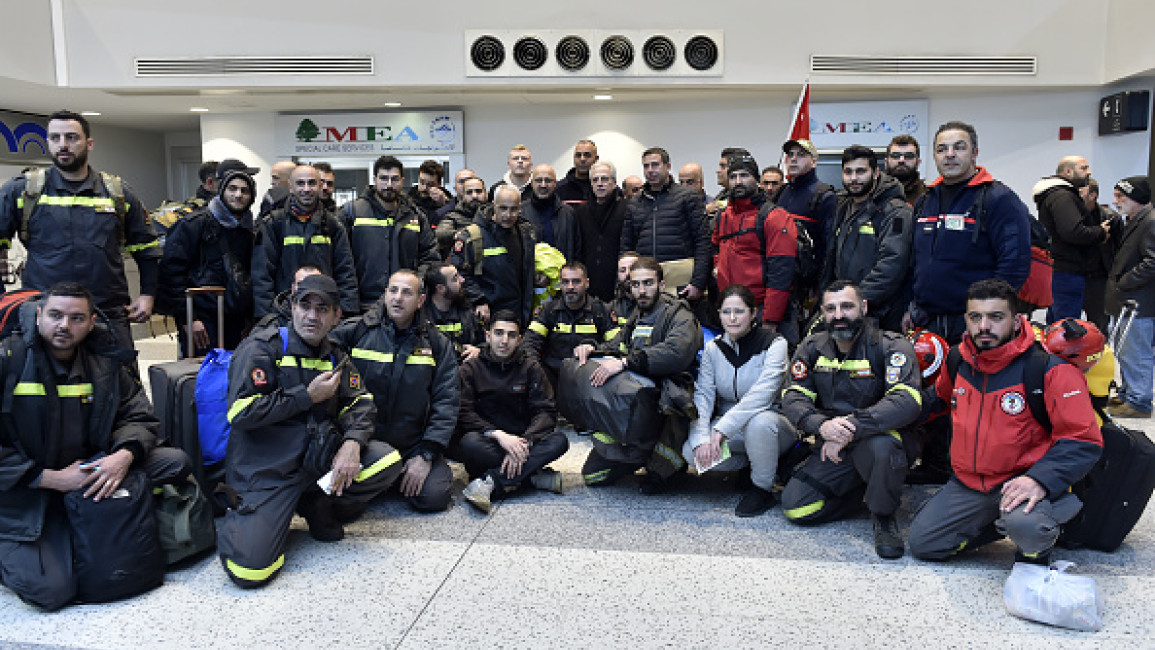Lebanon opens ports, airspace to facilitate aid to quake-hit Syria
Crisis-hit Lebanon has announced that it opened its ports and airspace to allow easier aid flow to Syria following a devastating series of earthquakes earlier this week.
The ports of Beirut and Tripoli as well as the Beirut International Airport are among the gateways open to send off the aid to Lebanon's neighbour, Public Works and Transport Minister Ali Hamieh said during a press conference Tuesday.
The Beirut Port was partially destroyed in the deadly 2020 blast - one of the world’s strongest non-nuclear explosions ever recorded - but still operates.
All air and maritime deliveries carrying humanitarian aid and passing through Lebanon into Syria will be exempt from fees and taxes, Hamieh added.
The magnitude 7.8 earthquake which struck southern Turkey on Monday devastated entire towns there and across the border in northern Syria. Sizeable earthquakes have wreaked further damage in the hours and days that followed.
The death toll so far in both countries stands at over 12,000, with over 13 million people directly affected by the quakes.
الوقوف مع #سوريا لمواجهة تداعيات #الزلزال كان عبر:
— Ali Hamie | علي حمية (@alihamie_lb) February 7, 2023
-تشكيل بعثة توجهت إليها للمساعدة في عمليات الإنقاذ والبحث والمسح الميداني .
-فتح المرافئ اللبنانية والمطار أمام الشركات المحملة بالمساعدات الانسانية وإعفائها من الرسوم#مطار_بيروت_هو_مطار_دمشق
و #مرفأ_طرابلس_هو_مرفأ_اللاذقيه pic.twitter.com/mKCwUbake1
A Lebanese team of first responders including the Lebanese army, Civil Defence, Red Cross and fire brigade has also headed to Syria to assist in rescue efforts.
A team of first responders also travelled to Turkey on Monday.
Lebanon, like other countries in the region, felt the tremors and following aftershocks.
A Lebanese ministerial delegation headed to Damascus on Wednesday and met with the Syrian regime's Foreign Minister Faisal Mekdad.
The four Lebanese ministers declared their "solidarity with the Syrian people in this ordeal" and offered "available capabilities" to help in the areas of relief, according to local media.
They offered their condolences on behalf of the Lebanese government, wishing "mercy for the victims and a speedy recovery for the wounded".
They later met with Syrian President Bashar al-Assad.
Unlike the aid pouring into Turkey, many countries remain hesitant on helping Syria in fear of violating the Caesar Act, a US law which sanctions governments if they deal with the Syrian regime.
Millions are in desperate need of aid in northern Syria, already battered by a 12-year conflict, a deep economic crisis, and recently a cholera outbreak.
"Immediately after the earthquakes hit, several Western countries mobilised to send aid and rescue teams to Turkey, but offered very little or nothing to Syria."@emadmoussa on the #TurkeySyriaEarthquake and selective humanitarianism: https://t.co/0YiqIPxmaH
— The New Arab (@The_NewArab) February 8, 2023
Lebanon has maintained diplomatic ties with Syria, but it adopted a so-called policy of dissociation following the beginning of the Syrian conflict in 2011, which put a dampener on official dealings. Despite Beirut’s official stance of remaining neutral, Iran-backed Hezbollah has fought alongside Assad’s forces and other Iranian and Russian-backed proxies.
Lebanese security officials and politicians have made several visits to Syria in recent years, but almost exclusively in a personal capacity or on behalf of political parties that support Assad's regime.
In 2021, a Lebanese ministerial team visited Damascus to discuss an energy plan that would see Lebanon import electricity from Egypt and Jordan via Syria. It marked the first official diplomatic visit in a decade.
On Wednesday, videos of Lebanese first responders helping in rescue efforts in Turkey went viral.
One video showed Lebanese Civil Defence and Red Cross members saving a pregnant woman and her daughter from a collapsed building.
بالفيديو: الفريق #اللبناني في #تركيا يُنقذ امرأة حامل وابنتها pic.twitter.com/sM911O6Evc
— Lebanon Debate (@lebanondebate) February 8, 2023
Lebanon’s efforts to assist in Syria and Turkey come as the country witnesses its worst-ever financial and economic crisis, which has dried up state finances and left millions unable to access their savings in commercial banks.
The crisis has seen the Lebanese Pound lose over 95 percent of its value and an energy sector meltdown.



